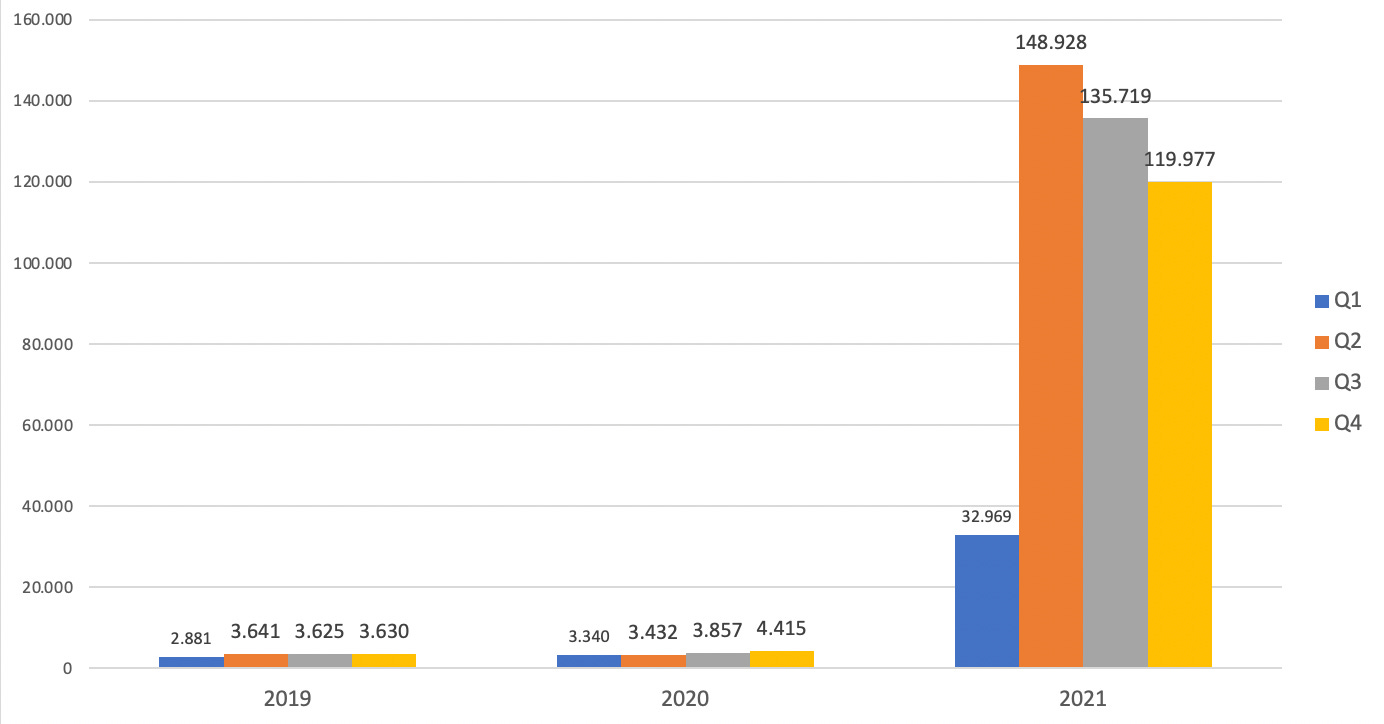TCW | 17 Aug 2022
ACCORDING to a response to an official request for information from the German insurance company Techniker Krankenkasse, the number of billed cases of vaccine-related adverse effects needing medical treatment rocketed in 2021 compared with 2019 and 2020. The request relates to four diagnostic codes:
- T.88.0: Infection following immunisation
- T.88.1: Other complications after immunisation
- U.12.9: Adverse effects after Covid-19 immunisation
- Y.59.9: Complications due to vaccines or biological substances
In 2019, the total number of payouts was 13,777. In 2020 it was 15,044. In 2021 the total number was 437,593. This is more than thirty-fold the average for those four codes in 2019-2020, a 2,937 per cent increase.

Number of payouts by the Techniker Krankenkasse related to codes T.88.0, T.88.1, U.12.9 and Y.59.9 by quarter
More precisely, it is the T.88.1 – Other complications after immunization (67 per cent of the total), and U.12.9 – Adverse effects after Covid-19 immunisation (32 per cent of the total), that are spiking. The latter code of course has no data for the prior years, but close to 150,000 incidences in 2021. The Covid-19 vaccinations are the only obvious explanation for the spike in the first one.
Approximately 11million people are insured by Techniker Krankenkasse, thus 473,593 cases of medical treatment resulting from vaccination amounts to around one in every 23 people insured. The rate for 2019 and 2020 is one in every 760.
The vaccination effort against Covid-19 is unprecedented in its scale and thus a rise in the number of adverse effects is to be expected. But what should be expected? We can try to correct for the difference in scale by comparing the Covid-19 vaccination effort with vaccination for other diseases. As the German total numbers are not easy to come by, we approximate this by using worldwide estimates. The WHO estimates that in 2017 2.7billion vaccine doses were administered worldwide. In 2021 57.7 per cent of the world population had received at least one dose of Covid-19 vaccines, which amounts to about 4.55billion people. From this we may conclude the number of persons vaccinated against Covid-19 last year was about 1.7 times the number otherwise vaccinated against other diseases. Thus, assuming the number of people vaccinated against other diseases stayed the same, the number vaccinated in total against any disease in 2021 was 2.7-fold the earlier number. Correcting for this difference we get an 11-fold increase in adverse effects needing medical treatment. This is a rough estimate, but gives us some idea of the actual rate.
Last February a board member of another German insurance company, BKK Provita, Andreas Schöfbeck, informed the Paul Ehrlich Institute [the German medical regulatory body] of a tenfold rise in incidence rate of adverse effects among the company‘s clients, due to the Covid-19 vaccines. After his disclosure Schöfbeck was promptly fired.
The US VAERS database shows a 35-fold increase in reported vaccine-related deaths in 2021 compared with 2019. In 2021 Iceland saw a 160-fold increase in reports of all adverse effects from vaccination against 2019.
Recent studies of excess mortality and adverse effects indicate the mRNA vaccines provide limited if any benefit. Dr Martin Kulldorff, former professor at Harvard Medical School, member of the US Food and Drug Administration‘s Drug Safety and Risk Management Advisory Committee and a former member of the Vaccine Safety Subgroup of the Centers for Disease Control’s Advisory Committee on Immunization Practices, concluded in an article in July that the benefits for working age people were unclear and that only those among the elderly ‘may benefit’ from the vaccines.
The new German numbers add to rising concerns regarding Covid-19 vaccines. Especially with the now prevalent and much milder Omicron variant, indications that vaccination increases infection and hospitalisation rates rather than decreasing them, and surges in all-cause mortality that in many instances seems related to booster campaigns, continuing to inject especially younger people is highly irresponsible, if not criminal. And now, a few weeks after Danish health authorities banned the vaccination of children below the age of 18, new Thai research indicates as many as one in three teenagers suffer from heart-related problems following mRNA vaccination.
This appeared in From Symptoms to Causes on August 13, 2022, and is republished by kind permission.


